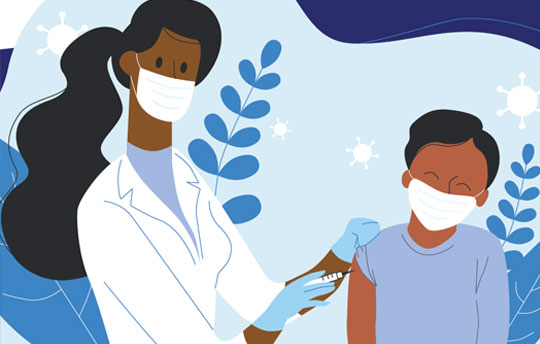 It’s the moment so many parents have been waiting for: COVID-19 vaccines are now recommended for children ages 6 months and older. This means that nearly 20 million more children can now be protected against COVID-19. Vaccination provides a critical opportunity to prevent serious illness, giving families with young children more options to participate in childcare, school, and other activities while protecting themselves and others through vaccination.
It’s the moment so many parents have been waiting for: COVID-19 vaccines are now recommended for children ages 6 months and older. This means that nearly 20 million more children can now be protected against COVID-19. Vaccination provides a critical opportunity to prevent serious illness, giving families with young children more options to participate in childcare, school, and other activities while protecting themselves and others through vaccination.
Both the Moderna and Pfizer-BioNTech COVID-19 vaccines have been approved for use in children ages 6 months through 5 years. The Moderna vaccine will be a two-dose primary series, and the Pfizer-BioNTech vaccine will be a three-dose primary series. After vaccination, children could have some mild and temporary side effects like those seen with other routine childhood vaccines.
CDC recommends that everyone ages 6 months and older get vaccinated, including children who have already had COVID-19. Both vaccines are safe and proven to protect children against serious illness from COVID-19. These vaccines have undergone—and will continue to undergo—the most intensive safety monitoring in U.S. history. Thousands of children participated in robust clinical trials to evaluate the safety of the vaccines and how well they work.
Impact of COVID-19 in Children and Teens
Just like adults, children and teens of all ages can:
- Get very sick from COVID-19
- Have both short- and long-term health problems
- Spread COVID-19 to others
There is no way to tell in advance how children or teens will be affected by COVID-19. Those with underlying medical conditions or who have a weakened immune system are more likely to get severely ill from COVID-19. Some examples of conditions that can make children more likely to get severe COVID-19 include:
- Asthma or chronic lung disease
- Diabetes
- Obesity
- Sickle cell disease
However, those without underlying medical conditions can also experience severe illness and be hospitalized. In fact, approximately 1 in 3 children younger than 18 years old hospitalized with COVID-19 have no underlying conditions.
Ongoing Safety Monitoring
Before authorizing or approving COVID-19 vaccines, scientists conducted clinical trials with thousands of children and teens to establish their safety and effectiveness.
COVID-19 vaccines are being monitored under the most comprehensive and intense vaccine safety monitoring program in U.S. history. CDC monitors all COVID-19 vaccines after they are authorized or approved for use. CDC and FDA will continue to monitor vaccines, keep people informed of findings, and use data to make COVID-19 vaccination recommendations.
Tips for Parents and Caregivers
Vaccinating children gives parents and caregivers greater confidence for children to participate in childcare and school and in sports, play dates, extracurricular activities, and other group activities.
When making an appointment or arriving for vaccination, parents and caregivers can let staff and/or volunteers know their child might need some accommodations. For example:
- Before vaccination, tell the vaccine provider about any allergies your child may have—just like what you would do when your child receives their routine vaccines.
- If you need accommodations at a COVID-19 vaccination site, you can let staff and/or volunteers know when making an appointment or arriving for vaccination.
- Children with service animals are allowed by law to have them accompany them at COVID-19 vaccination sites.
- If a child under your care is unable to leave the home, contact your state, territorial, local, or tribal health department to request an in-home vaccination.
Children and Teens with Disabilities at Increased Risk
Many children and teens with disabilities have underlying medical conditions such as lung, heart, or kidney disease, a weakened immune system, cancer, obesity, diabetes, some blood diseases, or conditions of the muscular or central nervous system. Children and teens with one or more underlying medical conditions are more likely to get severely ill from COVID-19.
Similarly, children and teens with developmental disabilities, such as cerebral palsy, an intellectual disability, or autism, may be more likely to experience mental health conditions from social isolation. They can also experience barriers to getting needed health care and other support, and can have other characteristics that increase their risk of COVID-19, including:
- Limited mobility
- Need for important support services
- Challenges practicing preventive measures, such as wearing a mask
- Challenges communicating symptoms of illness or being sick
- Prepare all children and teens for the vaccination visit and use resources such as picture stories for support during and after vaccination.
The Bottom Line on COVID-19 Vaccinations
The benefits of COVID-19 vaccination outweigh the known and potential risks.
- COVID-19 vaccines have been shown to be safe and effective at protecting against COVID-19 and preventing severe illness if infected.
- In clinical trials, about 20% of children and teens who participated had an underlying medical condition.
- Some children and teens with a weakened immune system should get an additional dose of vaccine as part of their primary COVID-19 vaccination series.
After vaccination, parents and caregivers should continue following all
current prevention measures recommended by CDC.
Learn more at https://www.thewellnesscoalition.org/covid/
